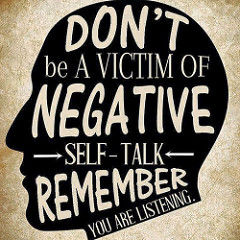Self-Talk
Negative Self-Talk: Don't Let It Overwhelm You
There are ways to overcome negative thinking.
Posted December 4, 2017

Most everyone is familiar with AA’s first step. “We admitted we were powerless over alcohol and our lives had become unmanageable”. Alcoholics lose control when they drink; addicts when they abuse drugs. Not only is control a huge issue for our loved ones, but for us as well.
So what can we do about this? Recently, I read this. “When you can’t control what’s happening challenge yourself to control the way you respond to what’s happening. That’s where the power is.”
What is it we need to control?
Not rescuing our loved ones, not reacting with anger and frustration, not succumbing to self-pity, not harboring resentment, and not letting worry and fear dominate our thoughts and lives. A tall order, especially when a loved one is actively abusing substances. It takes a lot of determination (“ I’m willing to learn how to better handle this situation”) and courage (“I need to own up to my part in this addiction dance”). None of this is easy. At least that’s been the case for me.
One of my biggest challenges has been how to gain control of negative thoughts.
According to the National Science Foundation the average person has about 12,000 to 60,00 thoughts per day. Of those, 80% are negative and 95% are exactly the same repetitive thoughts as the day before and about 80% negative. What we tell ourselves on an ongoing basis reflects not only the way we think but how we feel and act. In other words our thoughts influence how we create our reality. For those of us whose family members and friends abuse substances our reality is more negative than positive. Dr. Rick Hanson, a psychologist at the University of California at Berkeley, writes, “We were built to overlearn from negative experiences, but underlearn from positive ones.” If negative trumps positive than loved ones can easily spiral into depression or even despair. When my adult son was abusing substances, fear surfaced and wouldn’t let go.
My self-talk went something like this. What if he continues to use? Will he lose his job? If he loses his job, how will he support himself? How will he pay his rent, make his car payments, buy food and other necessities? Will I have to step in to support him? I’ve been advised not to do this. But if I don’t step in, he may lose everything. Can I sit by and let that happen? Should I let him hit rock bottom? What if he becomes homeless? Can I live with that?
My catastrophizing was all about negative feelings. But feelings aren’t facts. I needed to learn how to distinguish between the two. For example, today my son is in recovery. The fact is he could relapse again. Substance abuse is a disease. Relapse is a reality. But I don’t need to delve into negative “What if this or that happens.” Instead, I acknowledge this fact and monitor my self-talk. I remind myself that the worst liars are our fears.
Letting go of negative self-talk isn’t easy. Here are a few suggestions that may be helpful.
Identify what you can change. Recognize that you didn’t cause the addiction, you can’t control or cure it, but you can change the way you think about it. When I first attended my loved one’s group, I listened carefully to long time members who shared the ways in which they made positive changes. If they could do it, so could I.
Check yourself and get busy. I’ve given myself permission to worry for a set amount of time, say 15 minutes. (Sometimes I set a timer.) After that I might tackle household chores, or take a walk, run an errand, read a book, bake bread, listen to music or call a friend.
Follow a healthy lifestyle. Set a goal to exercise about 30 minutes most days of the week. (Zumba helps me stay centered.) Follow a healthy diet and embrace a few techniques, such as mindfulness, yoga, or time in nature to manage stress.
Be open to humor. Laugh and smile. At my loved one’s group, we often shake our heads and laugh at our obsessions and irrational behavior.
Practice positive self-talk. Don’t say anything to yourself you wouldn’t say to anyone else. Emphasize the positive in your life. Writing in my grateful journal helps mitigate negatives rattling around in my brain.
We may be powerless to change our loved ones, but we can change what we tell ourselves. That’s where the power is.


